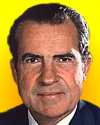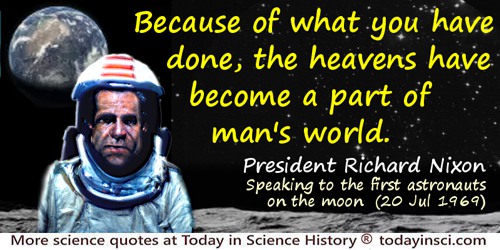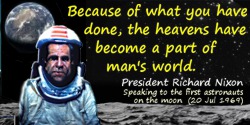 (source)
(source)
|
Richard M. Nixon
(9 Jan 1913 - 22 Apr 1994)
American president who was the 27th President of the United States (1969-1974), until he resigned over the Watergate scandal. It was during his first year in office that the first U.S. astronauts landed on the Moon.
|
Science Quotes by Richard M. Nixon (23 quotes)

~~[False attribution]~~ For years politicians have promised the moon. I'm the first one to be able to deliver it.
— Richard M. Nixon
Widely seen, purportedly from a telephone message to the astronauts on the moon (20 Jul 1969). However, by checking the actual recording of the message, it is easily proved that Nixon did NOT say this on that occasion.
~~[False attribution]~~ For years politicians have promised the moon. I'm the first one to be able to deliver it.
— Richard M. Nixon
Widely seen, purportedly from a telephone message to the astronauts on the moon (20 Jul 1969). However, by checking the actual recording of the message, it is easily proved that Nixon did NOT say this on that occasion.
~~[Questionable attribution]~~ What a strange creature man is that he fouls his own nest.
— Richard M. Nixon
Widely seen quoted, but Webmaster, as yet, has not found a reliable primary source to verify this attribution to Nixon. Since one cannot prove a negative, it can not be stated Nixon did not say this, but if he did, he is a millennium too late. Blogger Michael Gilleland states online, “As far as is known, the proverb, ‘It is an ill bird that fouls its own nest,’ was first recorded in Latin [around 1023] by Egbert von Lüttich in verse 148 of his 'Fecunda Ratis': nidos commaculans immundus habebitur ales.”
As never before, the work of the engineer is basic to the kind of society to which our best efforts are committed. Whether it be city planning, improved health care in modern facilities, safer and more efficient transportation, new techniques of communication, or better ways to control pollution and dispose of wastes, the role of the engineer—his initiative, creative ability, and hard work—is at the root of social progress.
— Richard M. Nixon
Remarks for National Engineers Week (1971). As quoted in Consulting Engineer (1971), 36, 18.
As our cities and suburbs relentlessly expand, those priceless open spaces needed for recreation areas accessible to their people are swallowed up—often forever. Unless we preserve these spaces while they are still available, we will have none to preserve. Therefore, I shall propose new financing methods for purchasing open space and parklands now, before they are lost to us.
— Richard M. Nixon
In State of the Union Address (22 Jan 1970).
Certainly, speaking for the United States of America, I pledge that, as we sign this treaty in an era of negotiation, we consider it only one step toward a greater goal: the control of nuclear weapons on earth and the reduction of the danger that hangs over all nations as long as those weapons are not controlled.
— Richard M. Nixon
'Remarks at the Signing Ceremony of the Seabed Arms Control Treaty' (11 Feb 1971), Public Papers of the Presidents of the United States: Richard M. Nixon (1972), 150.
Clean air, clean water, open spaces—these should once again be the birthright of every American. If we act now, they can be.
— Richard M. Nixon
In State of the Union Address (22 Jan 1970).
Commitment to the Space Shuttle program is the right step for America to take, in moving out from our present beach-head in the sky to achieve a real working presence in space—because the Space Shuttle will give us routine access to space by sharply reducing costs in dollars and preparation time.
— Richard M. Nixon
Statement by President Nixon (5 Jan 1972).
I have decided today that the United States should proceed at once with the development of an entirely new type of space transportation system designed to help transform the space frontier of the 1970s into familiar territory, easily accessible for human endeavor in the 1980s and ’90s.
This system will center on a space vehicle that can shuttle repeatedly from Earth to orbit and back. It will revolutionize transportation into near space, by routinizing it. It will take the astronomical costs out of astronautics. In short, it will go a long way toward delivering the rich benefits of practical space utilization and the valuable spin-offs from space efforts into the daily lives of Americans and all people.
— Richard M. Nixon
Statement by President Nixon (5 Jan 1972).
I shall propose to this Congress a $10 billion nationwide clean waters program to put modern municipal waste treatment plants in every place in America where they are needed to make our waters clean again, and do it now. We have the industrial capacity, if we begin now, to build them all within 5 years. This program will get them built within 5 years.
— Richard M. Nixon
In State of the Union Address (22 Jan 1970). [The Clean Air Act was signed by President Richard Nixon on 31 Dec 1970.]
If more of our resources were invested in preventing sickness and accidents, fewer would have to be spent on costly cures. … In short, we should build a true “health” system—and not a “sickness” system alone.
— Richard M. Nixon
'Special Message to the Congress Proposing a National Health Strategy' (18 Feb 1971), Public Papers of the Presidents of the United States: Richard M. Nixon (1972), 172.
Isn’t it better to talk about the relative merits of washing machines than the relative strength of rockets? Isn’t this the kind of competition you want?
— Richard M. Nixon
Speaking as US Vice-President to Soviet premier Nikita Krushchev at the American National Exhibition in Moscow, while viewing a display of a typical American kitchen, hence known as the “Kitchen Debate” (24 Jul 1959).
Listen, I don't know anything about polygraphs and I don’t know how accurate they are, but I know they’ll scare the hell out of people.
— Richard M. Nixon
Oval Office Tape (14 Jul 1971), quoted in Nature (23 Feb 1984) 307, 682.
Neil and Buzz, I am talking to you by telephone from the Oval Office at the White House, and this certainly has to be the most historic telephone call ever made. Because of what you have done, the heavens have become a part of man’s world. As you talk to us from the Sea of Tranquility, it inspires us to redouble our efforts to bring peace and tranquility to Earth.
— Richard M. Nixon
Speaking to the first astronauts while they were standing on the Moon (20 Jul 1969).
Peace means creative giving, making a contribution to the betterment of our own people and to the betterment of people throughout the world. And who better understands that than the men and women of American agriculture?
— Richard M. Nixon
'Remarks to Farm Leaders Participating in the “Salute to Agriculture”' (7 May 1971), Public Papers of the Presidents of the United States: Richard M. Nixon (1972), 627.
Restoring nature to its natural state … is a cause of particular concern to young Americans, because they more than we will reap the grim consequences of our failure to act on programs which are needed now if we are to prevent disaster later.
— Richard M. Nixon
In State of the Union Address (22 Jan 1970).
The automobile is our worst polluter of the air. Adequate control requires further advances in engine design and fuel composition. We shall intensify our research, set increasingly strict standards, and strengthen enforcement procedures—and we shall do it now.
— Richard M. Nixon
In State of the Union Address (22 Jan 1970).
The great question of the seventies is, shall we surrender to our surroundings, or shall we make our peace with nature and begin to make reparations for the damage we have done to our air, our land, our water? Restoring nature to its natural state is a cause beyond party and beyond factions. It has become a common cause of all the people of this country [America].
— Richard M. Nixon
In State of the Union Address (22 Jan 1970).
The program I shall propose to Congress will be the most comprehensive and costly program in this field in America’s history. It is not a program for just one year. A year’s plan in this field is no plan at all. This is a time to look ahead not a year, but 5 years or 10 years—whatever time is required to do the job.
— Richard M. Nixon
In State of the Union Address (22 Jan 1970). [The Clean Air Act was signed by President Richard Nixon on 31 Dec 1970.]
The sky is no longer the limit.
— Richard M. Nixon
From Medal of Freedom presentation speech given to the three astronauts of the first manned moon landing mission. In Leon Wagener, One Giant Leap: Neil Armstrong's Stellar American Journey (2004), 226.
This is the greatest week in the history of the world since the Creation, because as a result of what happened in this week, the world is bigger, infinitely, and also … as a result of what you have done, the world has never been closer together before.
— Richard M. Nixon
Referring to their successful landing on the Moon, as he spoke to the returning Apollo 11 astronauts, through a window in their mobile quarantine unit, on the rescue ship USS Hornet (24 Jul 1969).
We can no longer afford to consider air and water common property, free to be abused by anyone without regard to the consequences. Instead, we should begin now to treat them as scarce resources, which we are no more free to contaminate than we are free to throw garbage into our neighbor’s yard.
— Richard M. Nixon
In State of the Union Address (22 Jan 1970).
We still think of air as free. But clean air is not free, and neither is clean water. The price tag on pollution control is high. Through our years of past carelessness we incurred a debt to nature, and now that debt is being called.
— Richard M. Nixon
In State of the Union Address (22 Jan 1970).
Quotes by others about Richard M. Nixon (3)
[Richard Nixon] is the kind of politician who would cut down a redwood tree, and then mount the stump and make a speech for conservation.
Campaign speech (1956). Quoted in Jean H. Baker, The Stevensons: A Biography of an American Family (1997), 328.
Jean H. Baker - 1997
The aether: Invented by Isaac Newton, reinvented by James Clerk Maxwell. This is the stuff that fills up the empty space of the universe. Discredited and discarded by Einstein, the aether is now making a Nixonian comeback. It’s really the vacuum, but burdened by theoretical, ghostly particles.
In Leon Lederman and Dick Teresi, The God Particle: If the Universe is the Answer, What is the
Question (1993, 2006), xiii.
In the fall of 1972 President Nixon announced that the rate of increase of inflation was decreasing. This was the first time a sitting president used the third derivative to advance his case for reelection.
In 'Mathematics Is an Edifice, Not a Toolbox', Notices of the AMS (Oct 1996), 43, No. 10, 1108.

 In science it often happens that scientists say, 'You know that's a really good argument; my position is mistaken,' and then they would actually change their minds and you never hear that old view from them again. They really do it. It doesn't happen as often as it should, because scientists are human and change is sometimes painful. But it happens every day. I cannot recall the last time something like that happened in politics or religion.
(1987) --
In science it often happens that scientists say, 'You know that's a really good argument; my position is mistaken,' and then they would actually change their minds and you never hear that old view from them again. They really do it. It doesn't happen as often as it should, because scientists are human and change is sometimes painful. But it happens every day. I cannot recall the last time something like that happened in politics or religion.
(1987) -- 


